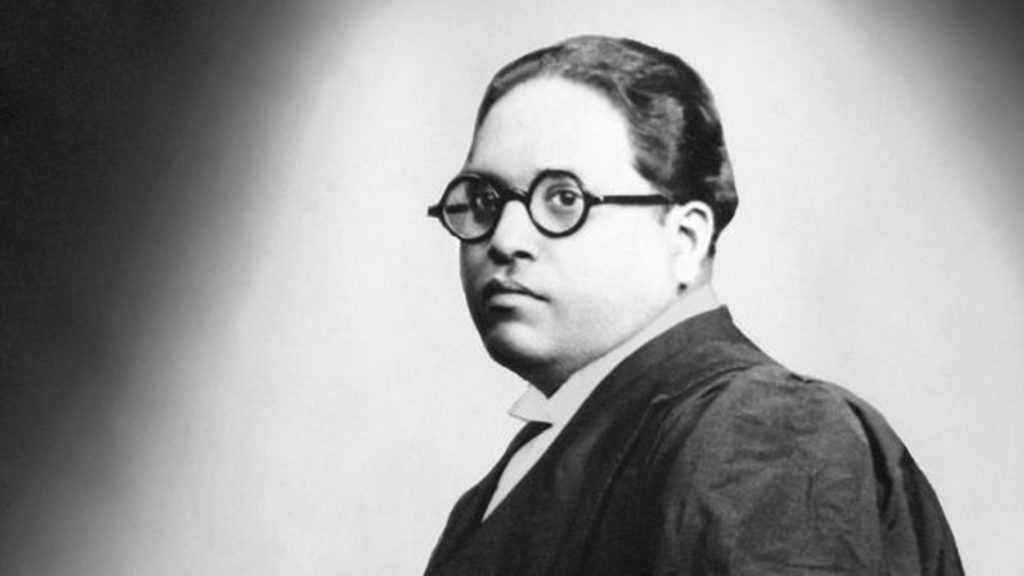
What are the Prospects of Democracy in India? – By Dr. B. R. Ambedkar
The subject assigned to me is, “What are the prospects of democracy in India?” Most Indians speak with great pride as though their country was already a democracy. The foreigners also, when they sit at a dinner table to do diplomatic honor to India, speak of the Great Indian Prime Minister and the Great Indian Democracy.
From this, it is held without waiting to argue that where there is a Republic, there must be a democracy. It is also supposed that where there is Parliament which is elected by the people on adult suffrage and the laws are made by the People’s Representatives in Parliament elected after few years, there is the democracy. In other words, democracy is understood to be a political instrument and where this political instrument exists, there is a democracy.
Is there democracy in India or is there no democracy in India? What is the truth? No positive answer can be given unless the confusion caused by equating democracy with Republic and by equating democracy with Parliamentary Government is removed.
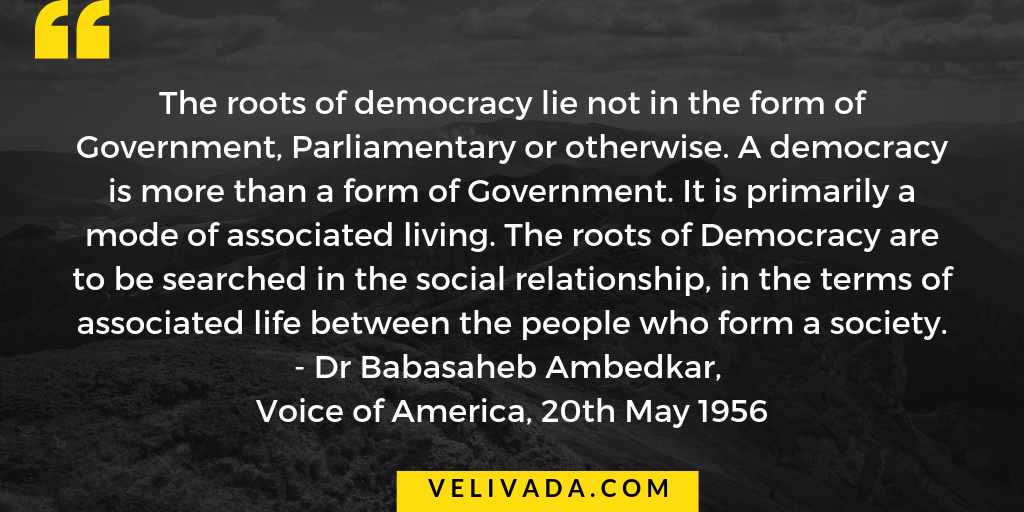
Democracy is quite different from a Republic as well as from the Parliamentary Government. The roots of democracy lie not in the form of Government, Parliamentary or otherwise. A democracy is more than a form of Government. It is primarily a mode of associated living. The roots of Democracy are to be searched in the social relationship, in terms of associated life between the people who form a society.
What does the word ‘Society’ cannot? To put it briefly when we speak of ‘Society,’ we conceive of it as one by its very nature. The qualities which accompany this unity are a praiseworthy community of purpose and desire for welfare, loyalty to public ends and mutuality of sympathy and co-operation.
Are these ideals to be found in Indian Society? Indian Society does not consist of individuals. It consists of an innumerable collection of castes which are exclusive in their life and have no common experience to share and have no bond of sympathy. Given this fact, it is not necessary to argue the point. The existence of the Caste System is a standing denial of the existence of those ideals of society and therefore of democracy.
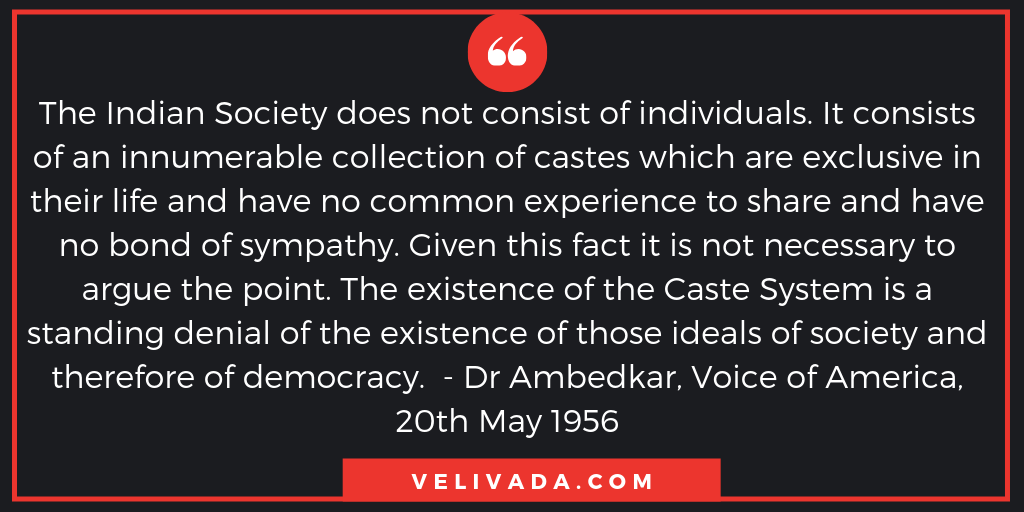
Indian Society is so embedded in the Caste System that everything is organized on the basis of caste. Enter Indian Society and you can see caste in its glaring form. An Indian cannot eat or marry with an Indian simply because he or she does not belong to his or her caste. An Indian cannot touch an Indian because he or she does not belong to his or her caste. Go and enter politics and you can see caste reflected therein. How does an Indian vote in an election? He votes for a candidate who belongs to his own caste and no other. Even the Indian Congress exploits the Caste system for election purpose as no other political party in Indian does. Examine the lists of its candidates in relation to the social composition of the constituencies and it will be found that the candidate belongs to the caste which is the largest one in that constituency. The Congress, as a matter of fact, is upholding the Caste System against which it is outworldly raising an outcry against the existence of caste.
Go into the field of industry. What will you find? You will find that all the topmost men drawing the highest salary belong to the caste of the particular industrialist who owns the industry. The rest hang on for life on the lowest rungs of the ladder on a pittance. Go into the field of commerce and you will see the same picture. The whole commercial house is one camp of one caste, with no entry board on the door for others.
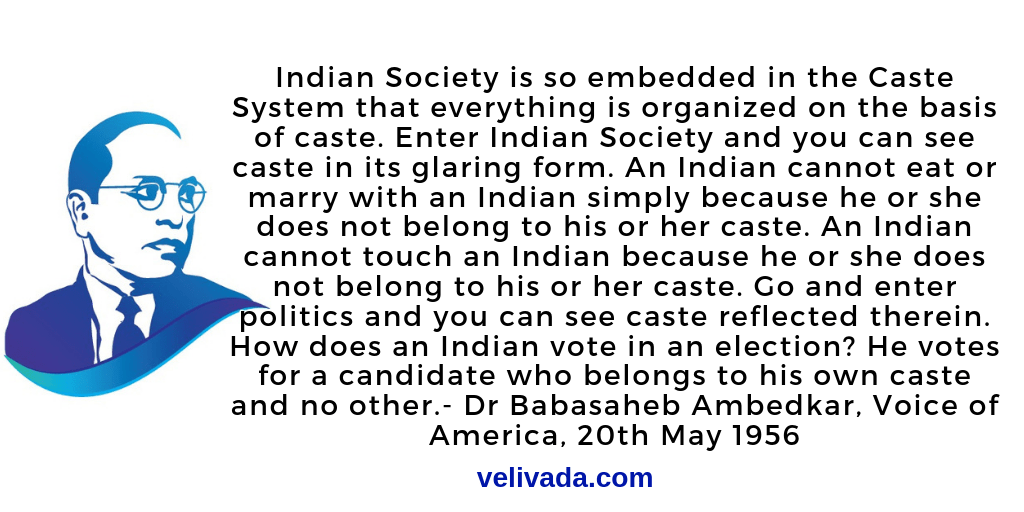
Go into the field of charity. With one or two exceptions all charity in India is communal. If a Parsi dies, he leaves his money for Parsis. If a Jain dies, he leaves his money for Jains. If a Marwadi dies, he leaves his money for Marwadis. If a Brahmin dies, he leaves his money for Brahmins. Thus, there is no room for the downtrodden and the outcastes in politics, in industry, in commerce, and in education.
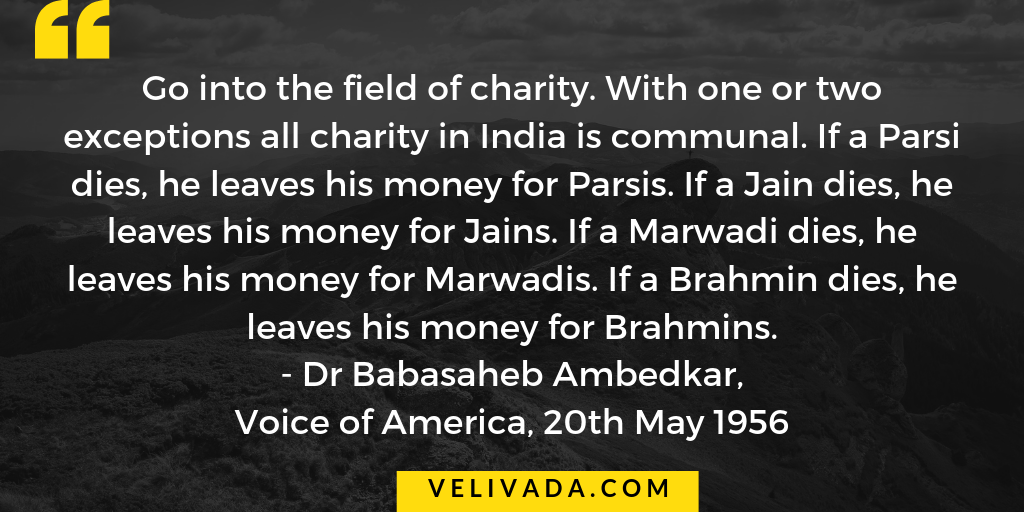
There are other special features of the Caste System which have their evil effects and which militate against Democracy. One such special feature of the Caste System lies in its being accompanied by what is called ‘Graded Inequality’ Castes is not equal in their status. They are standing one above another. They are jealous of one another. It is an ascending scale of hatred and descending scale of contempt. This feature of the Caste system has most pernicious consequences. It destroys willing and helpful co-operation.
Caste and class differ in the fact that in the Class System there is no complete isolation as there is in the Caste System. This is the second evil effect in the Caste System accompanied by inequality. This manifests itself in the fact that the stimulus and response between two castes is only one-sided. The higher caste act in one recognised way and the lower caste must respond in one established way. It means that when there is no equitable opportunity to receive the stimulus from and to return the response from different caste, the result is that the influences which educate some into masters, educate others into slaves. The experience of each party loses its meaning when the free interchange of varying modes of life experience is arrested. It results into a separation of society, into a privileged and a subject class. Such a separation prevents social endosmosis.
There is a third characteristic of the Caste System which depicts the evils thereof which cuts at the very roots of democracy. It is that one caste is bound to one occupation. Society is no doubt stably organized when each individual is doing that for which he has aptitude by nature in such a way as to be useful to others; and that it is the business of society to discover these aptitudes and progressively to train them for social use. But there is in a man an indefinite plurality of capacities and activities which may characterize an individual. A society to be democratic should open a way to use all the capacities of the individual. Stratification is stunting of the growth of the individual and deliberate stunting is a deliberate denial of democracy.
How to put an end to the Caste System? The first obstacle lies in the system of graded inequality which is the soul of the Caste System. Where people are divided into two classes, higher and lower, it is easier for the lower to combine to fight the higher, for there is no single lower class. The class consists of lower and lowerer. The lower cannot combine with the lowerer. For the lower is afraid that if he succeeds in raising the lowerer, he may well himself lose the high position given to him and his caste.
The second obstacle is that, the Indians Society is disabled by unity in action by not being able to know what is its common good. Plato has said that the organization of society depends ultimately upon knowledge of the end of existence. If we do not know its end, if we do not know its good, we shall be at the mercy of accident and caprice. Unless we know the good of the end, we have no criterion for rationally deciding what the possibilities are which we should promote. Question is, can the Indian Society in its caste-bound state achieve what is the ultimate question? We come upon the most insuperable obstacle that such knowledge is not possible save in a just and harmonious social order. Can there be a harmonious? Social Order under the Caste System? Everywhere the mind of the Indians is distracted and misled by false valuations and false perspectives. A disorganized and factional society sets up a number of different models and standard. Under such conditions, it is impossible for individual Indian to reach the consistency of mind on the question of caste.
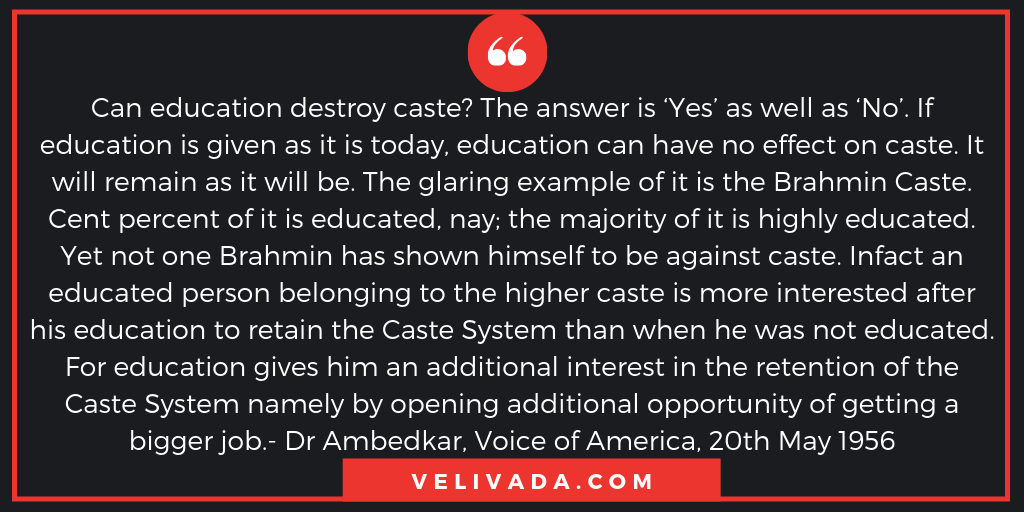
Can education destroy caste? The answer is ‘Yes’ as well as ‘No’. If education is given as it is today, education can have no effect on caste. It will remain as it will be. The glaring example of it is the Brahmin Caste. Cent percent of it is educated, nay; the majority of it is highly educated. Yet not one Brahmin has shown himself to be against caste. Infact an educated person belonging to the higher caste is more interested after his education to retain the Caste System than when he was not educated. For education gives him an additional interest in the retention of the Caste System namely by opening additional opportunity of getting a bigger job.
From this point of view, education is not helpful as means to dissolve caste. So far is the negative side of education. But education may be solvent if it is applied to the lower strata of the Indian Society. It would raise their spirit of rebellion. In their present state of ignorance, they are the supporters of the Caste System. Once their eyes are opened they will be ready to fight the Caste System.
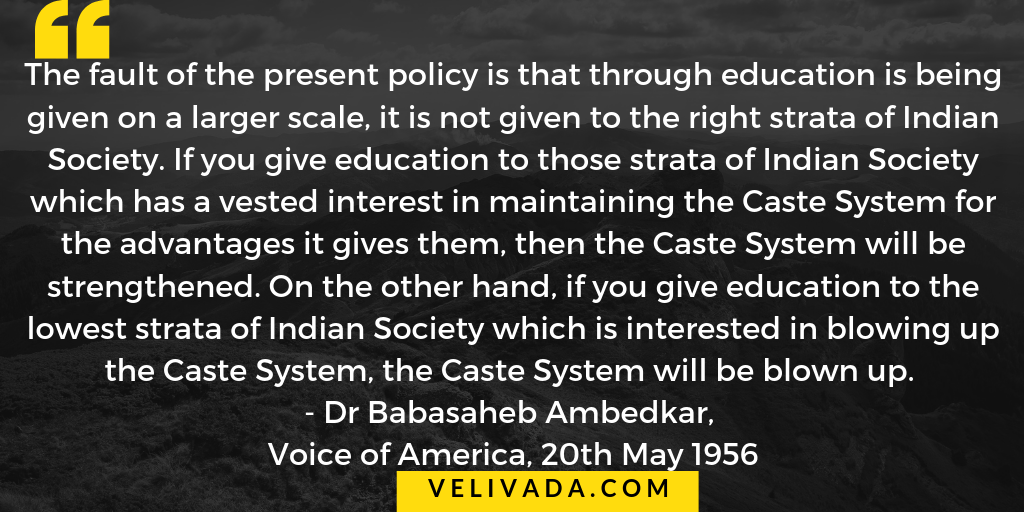
The fault of the present policy is that through education is being given on a larger scale, it is not given to the right strata of Indian Society. If you give education to those strata of Indian Society which has a vested interest in maintaining the Caste System for the advantages it gives them, then the Caste System will be strengthened. On the other hand, if you give education to the lowest strata of Indian Society which is interested in blowing up the Caste System, the Caste System will be blown up. At the moment the indiscriminate help given to education by the Indian Government an American Foundation is going to strengthen the Caste System. To make rich richer and poor poorer is not the way to abolish poverty. The same is true of using education as a means to end the Caste System. To give education to those who want to keep up the Caste System is not to improve the prospect of Democracy in India but to put our Democracy in India in greater jeopardy.
Sd/ B. R. Ambedkar
26, Alipur Road,
New Delhi,
Dated: 20th may 1956.
* Voice of America, 20th May 1956.
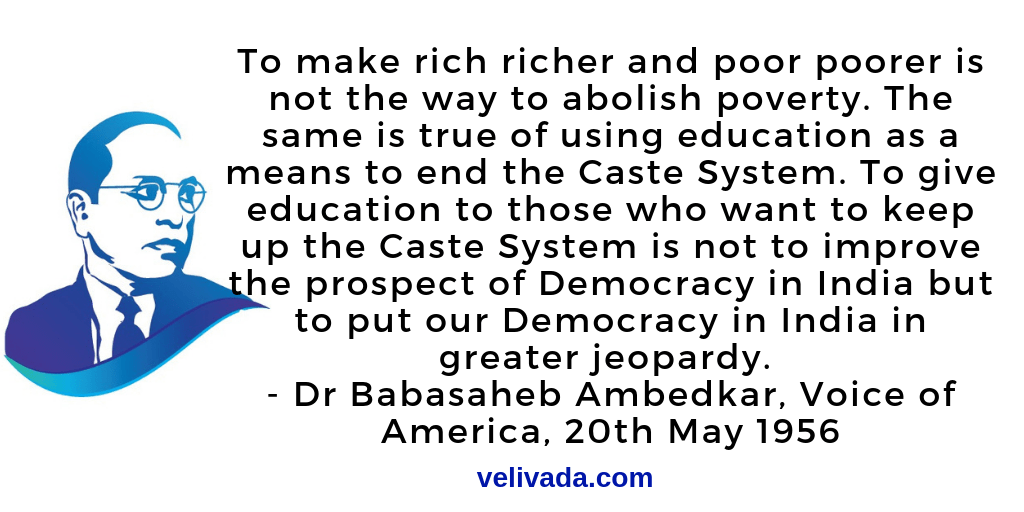



+ There are no comments
Add yours